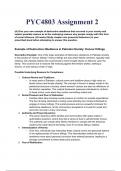PYC4803 Assignment 2
(A) Give your own example of destructive obedience that occurred in your society and
explain possible reasons as to the underlying reasons why people comply with this form
of social influence. (20 marks) Study chapter nine (prosocial behaviour) in your
prescribed book before attempting to answer this question.
Example of Destructive Obedience in Pakistani Society: Honour Killings
Descriptive Example: One of the tragic examples of destructive obedience in Pakistani society
is the practice of "honour killings." Honour killings are acts where family members, typically male
relatives, kill a female relative who is perceived to have brought shame or dishonor upon the
family. This could be due to reasons like marrying against the family's wishes, seeking a
divorce, or even being a victim of rape.
Possible Underlying Reasons for Compliance:
1. Cultural Norms and Traditions:
○ In many parts of Pakistan, cultural norms and traditions place a high value on
family honour and female chastity. The concept of honour is deeply rooted in the
patriarchal structure of society, where women's actions are seen as reflections of
the family's reputation. This cultural framework pressures individuals to conform
to these norms, even when they involve committing violent acts.
2. Social Pressure and Fear of Ostracism:
○ Families often face immense social pressure to conform to societal expectations.
The fear of being ostracized or losing social standing can compel individuals to
engage in honour killings. This social pressure acts as a powerful motivator for
destructive obedience, as the community’s acceptance is crucial for social and
economic survival in many rural areas.
3. Authority and Power Dynamics:
○ The power dynamics within families and communities often place males in
authoritative positions, where they feel a sense of duty to uphold family honour.
This authority can compel other family members to comply with the decisions
made by the male head of the family, even if it involves killing a relative.
4. Internalization of Norms:
○ Over time, individuals may internalize these cultural norms and genuinely believe
in the righteousness of honour killings. This internalization makes the act of
obedience more about personal conviction than external pressure, leading to a
stronger commitment to these destructive practices.
5. Fear of Retribution:
, ○ In some cases, the threat of retribution from other community members if one
does not conform to the practice of honour killings can drive individuals to obey.
The fear of becoming a target themselves or facing violent backlash can force
compliance.
6. Lack of Legal Enforcement:
○ Weak legal enforcement and lenient punishments for honour killings can
contribute to their prevalence. When individuals see that such acts go
unpunished or receive light sentences, they are more likely to comply with the
destructive norms. The absence of strong legal deterrents emboldens
perpetrators and perpetuates the cycle of violence.
7. Social Learning and Modeling:
○ The social learning theory suggests that individuals learn behaviors by observing
others, especially authority figures. In communities where honour killings are
prevalent, younger generations may observe and imitate these behaviors,
perceiving them as acceptable and necessary to maintain family honour.
8. Economic Dependency:
○ Economic dependency on male family members can also play a role in
compliance. Women and other dependents may feel powerless to oppose
destructive commands due to their financial reliance on the perpetrators. This
economic dependency reinforces the authority of those who advocate for honour
killings.
Conclusion
Destructive obedience, such as honour killings in Pakistani society, is a complex phenomenon
rooted in cultural norms, social pressures, power dynamics, and a lack of legal deterrents.
Understanding these underlying reasons is crucial for developing strategies to combat this form
of social influence and promote prosocial behaviors. Addressing cultural attitudes, strengthening
legal frameworks, and empowering individuals through education and economic opportunities
are essential steps towards reducing destructive obedience and fostering a more just society.
(B) Using the prosocial behavior theory of empathy as an important foundation for
helping, critically discuss whether people who choose to do volunteer work are
empathetic. (20 marks) Study chapter ten (aggression) in your prescribed book before
attempting to answer the following two questions.
Empathy as a Foundation for Prosocial Behavior
Empathy, the ability to understand and share the feelings of others, is a crucial component of
prosocial behavior. According to the empathy-altruism hypothesis proposed by Batson (1991),
people are more likely to engage in helping behaviors when they feel empathy toward someone
in need. This hypothesis suggests that empathetic concern prompts individuals to alleviate
another's distress, leading to altruistic actions.





